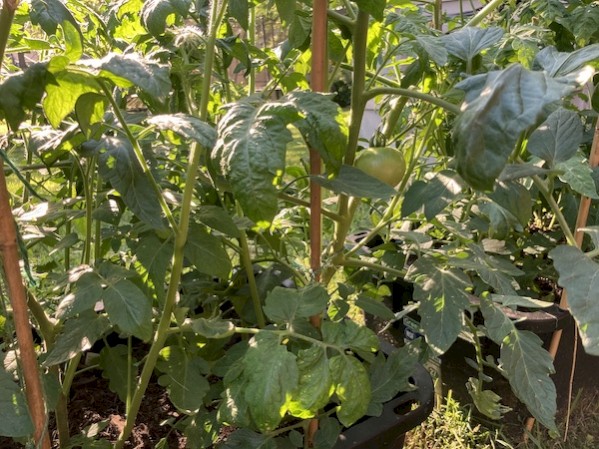Though I’ve tended a large flower garden in my front yard for 15 years, vegetables have always intimidated me. I have no idea why. This year, I decided to cast all that aside and give it a try.
In early May, I bought 10 tomato plants, plus some sweet red peppers, cucumbers, and herbs, and stuck them all in big tubs. I had no idea if this was a lot or a little. A friend who is a veggie garden pro came over and took a look. “You’re going to have tomatoes coming out your ears!” he said.
“Oh, so it IS a lot?”
He looked at my cacophony of vines, planted far too closely together, and laughed. “Uh, yeah. Get ready to learn how to can.”

As the vines are getting taller and taller and more little green fruits are sprouting every day, I suspect that he’s right: My harvest will be more abundant than I predicted!
I talk to my gangly plants each night, “Hey friends. You’re doing so great. I’m glad you like it here. I hope you have enough room. I grew up in a small ranch house with 9 people and had to share a room with both a brother and a sister when I was little, so I know that close quarters can be challenging.”
I’m taking loving care of these plants, and they will reward me by filling my salad bowl.
Reciprocity.
What’s ironic in the most wonderful way is that I am working my way through listening to an audiobook all about reciprocity: Braiding Sweetgrass: Indigenous Wisdom, Scientific Knowledge, and the Teachings of Plants, by Robin Wall Kimmerer. Kimmerer has a PhD in botany and is a plant ecologist and professor at SUNY. Of European and Anishinaabe ancestry, she’s also an enrolled member of the Citizen Potawatomi Nation.
During hot summer morning runs, I’m listening to Kimmerer narrate this beautiful, thoughtful book. Some chapters offer insight about how plants work together, with tales of her students coming to realizations about the natural world when she takes them out for field work. Other chapters recount stories of raising her daughters and trying her hand at making maple syrup or cleaning up their pond to make it swimmable. Still others talk about her joy in trying to learn the Potawatomi language, balanced alongside the horror of what happened to her grandfather’s people when they were forced from their land and the children were sent to Indian boarding school and stripped of their culture and language.
But every chapter returns to the theme of reciprocity—with each other, with the land, and with all living things.
When you look at any activity—parenting, writing, growing tomatoes—through the lens of reciprocity, it changes how you see things.
One of my favorite ideas from the book is that when we love our gardens, they love us back. I give the gift of my time and attention. In return, my garden gives me the gift of its beauty, and in the case of vegetables, its nourishment. I wouldn’t have thought of those precise words: My garden loves me back. But of course it does.
I’ve been frustrated of late that so many human beings are behaving as if we don’t owe each other things. To counter this, I’ve focused on the value of generosity. This is a good value and one I intend to keep cultivating. I’ve also been focused on the value of honesty—communicating more honestly in a world determined to lie. (I wrote a book about honesty last year.)
But reciprocity is a horse of another kind, I think.
Reciprocity says, Hey wait, maybe I’m not in it alone. Maybe it doesn’t have to be me against the world, trying to right wrongs with my generosity and my honesty.
What if the world isn’t a story about how we owe each other things, but rather, a story about how we freely give each other things?
What I love about this book is that Kimmerer doesn’t focus on categorizing everything that is wrong with Western culture. She could, because the problems and atrocities are staggering. But instead, she spends her influence telling stories about moss and maple syrup and sweetgrass that can help us look at the world differently. That’s what we need right now. Or at least it’s what I need right now.
If our interactions with the land and living things were based on reciprocity instead of owing, what might be different? If we believed that the natural world could love us back, what would be different?
I’m rolling these questions around in my mind as I water each night and check the growth of my charges. They’ve got rain and my gardening hose. They’ve got abundant sun. They’re crowded as shit because I don’t yet know what I’m doing. But they’ve got love.
“Thank you,” I whisper to them.
“Thank you,” they whisper back.

